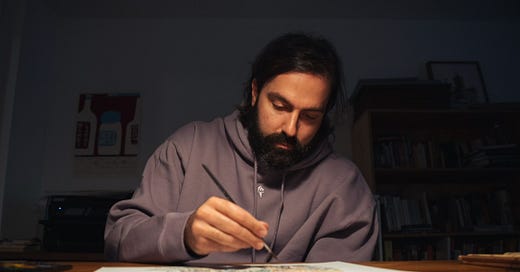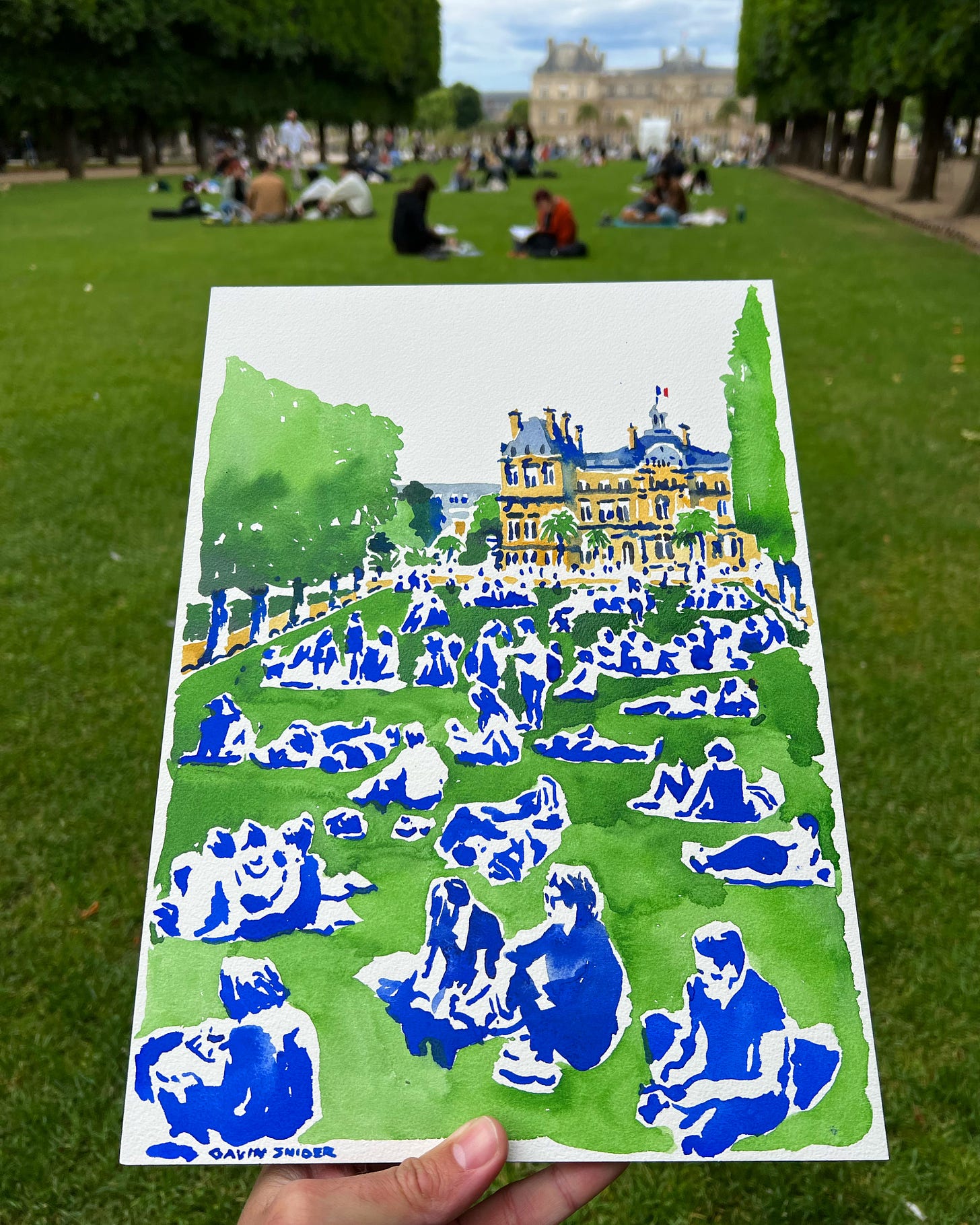Finding Liberation in *Not* Trying to be the Best: Interview with Artist, Gavin Snider
This week’s interview is with artist and part-time architect, Gavin Snider. I came across Gavin’s work while living in Brooklyn and found myself drawn to the way he captured everyday scenes around the city. When I look at his work, I am reminded of all the reasons I fell in love with New York as an 18-year-old and how much wonder I felt as I discovered the city.
While Gavin grew up drawing in an artistic family, it took him some time to pursue his passion for art professionally. Like many of us, when it came time to head to college and choose a career path, he set aside his passions in favor of finding a “real job.” Gavin ended up choosing architecture as an avenue that would at least enable him to be able to draw professionally. However, over time he found himself burnt out by technical drawing and gradually found his way back to his roots - drawing because he loved it with no expectation of what something had to be. Years later, that passion for drawing has led to a career path where art is now his profession. He continues to practice architecture but sees himself first and foremost as an artist.
In the interview, we spoke about:
Rediscovering his passion for art and how his technical drawing and creative drawing eventually met in unexpected ways
Confronting fears associated with taking your art seriously
Finding liberation is knowing that you will never be the best at something in New York City
How his relationship to discomfort has changed over the years and what construction has taught him about not freaking out when things go wrong
How talking to people while painting helps him take the pressure down as an artist
The importance of being process-oriented over product-oriented
Note: The following interview has been lightly edited for clarity and length. While every effort has been made to preserve the integrity of the conversation, please be aware that the quotes may not be verbatim but reflect the essence of the dialogue.
How would you describe your occupation?
I’m an artist with a background in architecture who still happens to be working in architecture. It took me a really long time to be comfortable saying, “I am an artist.” I’d say things like, “I'm an illustrator” or “I'm a designer.” Eventually, I thought, “What am I saying?” I am an artist. I paint. I draw. I make music. Whatever the thing is, it’s art. As an artist, I’d describe my job as working in a number of different disciplines, but painting is the most common one right now.
I think a lot of people will resonate with your original thinking that you couldn’t be an artist as a career because it wasn’t a “real job.” You landed on pursuing architecture because at least it was a profession where you could draw. What eventually led you to pursue art professionally?
I’ve been drawing all my life. Everybody in my family is artistic, so I was always encouraged to follow that pursuit. I ended up choosing architecture as an avenue to draw, but I ended up getting really burnt out by drawing in architecture. While drawing and architecture can complement each other, they’re two different things. I worked through the burnout by going back to my childhood roots of just starting with a piece of paper with no expectation about what it had to be. It started with super wacky posters I made for my band’s shows and shifted over time toward architectural scenes, cityscapes, and landscapes. It became my passion again and, over time, a fairly viable profession. I think what kept me going was being able to separate the rational technical side from the exploratory creative side, and then having those two sides meet in unexpected ways.
I often work with creative people who are afraid to take their art seriously for fear of failing. They fear being heartbroken or let down by not getting published or noticed or whatever the expectation is. That fear often keeps them from getting started and trying. Does that resonate with you at all? If so, what helped you overcome those types of fears?
I think that’s a very real thing. The flip side of that can be when you do have a big success, you’ll quickly forget it and pivot to thoughts like, “Well, I haven't gotten any new projects this month,” even though you worked on your biggest project ever the prior month.
I think the way to get through those fears is to view it as a practice. It’s like working out. You don’t work out every day only to run a marathon or be a successful NFL player. People are very comfortable working out just to keep their body and mind sharp. Practice is the same way. It’s treating your art as something you can dive into each day, work on a little bit, and advance it. Some days will be more successful than others. Sometimes you'll get recognized for that thing. You have to learn to connect to the work and remove the attachment to external goals and external factors. I think that's what has kept me doing it. When I paint and draw, I just love what I’m doing.
If people see a post about my painting on Instagram and it gets all these likes, that’s wonderful and, of course, I love the gratification. It does keep me going. But I also have to enjoy being there in that moment and creating that painting. That's the real thing that keeps me going. I’ve also found this to be true with my music. In college, I started learning guitar and playing in a bunch of bands, none of which you could really call a success. We're 10 years in and still happy playing for 15 people at a bar in Park Slope. We don't have an audience really, but the fact is that my bandmates and I enjoy playing with each other and collaborating in that way. I would like to have a larger audience, but I put my energy in other places like my visual art. Music is something I can do purely for the love of it. Nobody's telling me how to do it or what to do. There's no goal. The goal is just the thing and being present to the thing.
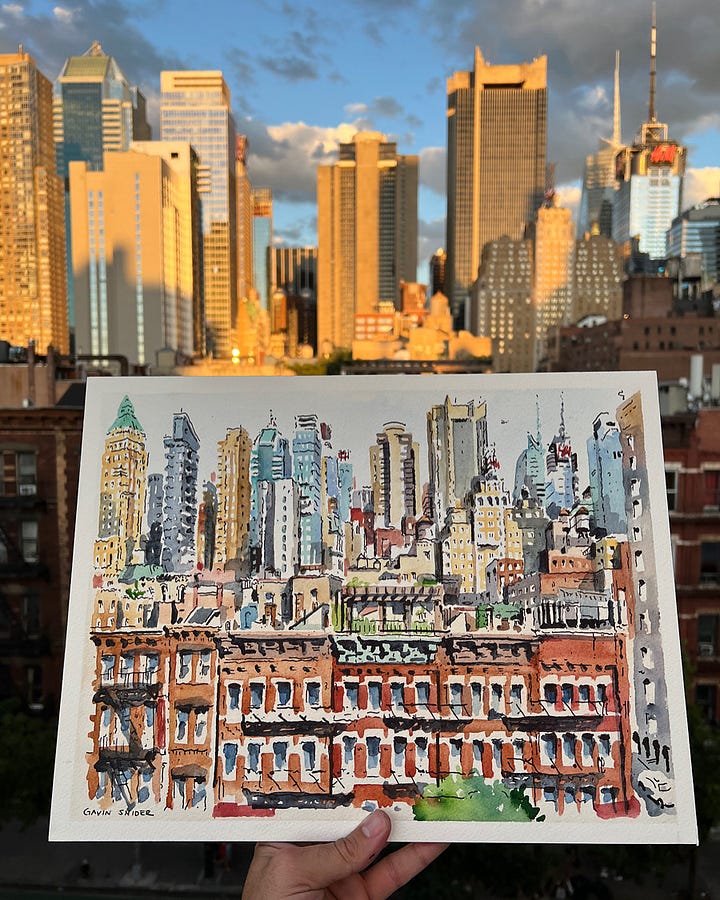
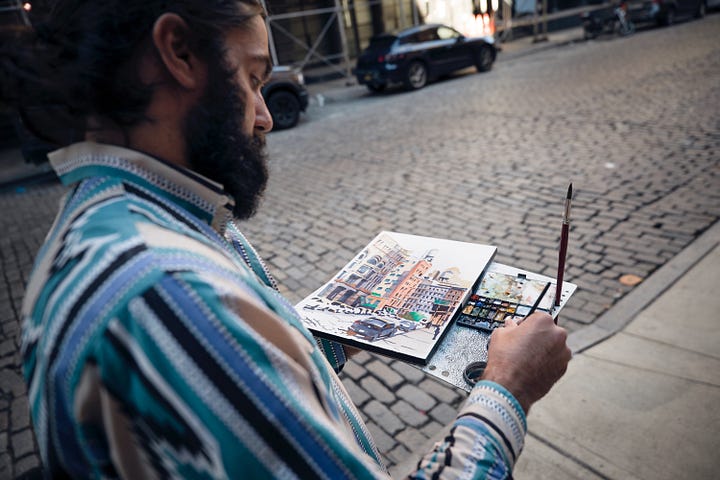
If you’re overly attached to external results, you’ll find a million results to get discouraged and quit. If the reason to do something is because you love doing it and enjoy the process, you could do it forever.
Exactly. New York is such a great place to be an artist because it's a very grounding place. You can never be the best at something in New York. There's always gonna be somebody doing something better than you that you don't even know about. For instance, this weekend I went to see some Gowanus open studios a block from my apartment. There were probably 20 artists, some of whom are famous artists that I follow on social media, yet I had no idea their studio was a block from my house. That’s everywhere in New York. It takes away the pressure to be the best at something because you can't. You never will be. It’s very different from how I grew up in the Midwest. In the artistic and architectural scene in Kansas City, I think there was a little bit of a mentality of, “Well, they're the best. They own that thing. You can't do that thing because they do it already.” It’s totally false, but I think I internalized that. Living in New York and not worrying about being the best at something has been so liberating.
I enjoyed listening to an interview of yours where you spoke about realizing that some of the paintings you hated the most, or thought were bad at first, were created in moments when you were trying something new or learning something. Many people struggle with being “bad” at something and feel uncomfortable at the thought of being a beginner again. What’s helped you get comfortable with trying new things and being a “beginner” over the course of your career?
That fear gets ingrained in us from such an early age. Take art class in elementary school, you’re immediately labeled as being “good” at art or being “bad” at art. That mentality is everywhere. I’m going to butcher a quote from a friend of mine who used to say, “To be an artist, you have to do something worse than everyone else.” It’s a really uncomfortable place to be, but if you can embrace the reality, you might learn to play piano like nobody else has ever played piano and stumble and bumble your way to becoming an artist.
It’s taken me years to learn that. One thing that’s helped me a lot is just setting constraints. I’ll say, “Today you’re going to do a painting in 20 minutes.” Or I’ll do something like paint with oils, which I haven’t touched since high school. It’s been refreshing to take a step back and confront the fear of the unknown. I think age and experience help. You become more comfortable with yourself and not having to be perfect at everything. Perfectionism doesn't really suit the actual creation of art so I'm always fighting back against that impulse.


I’m sure it didn’t start this way but your work today very much feels like it has a distinct perspective and style where I can tell that it’s yours. What mindset or approach helped you find your artistic voice?
My style has changed a lot. If you look at my drawings from 10 years ago, it’s not how I’m painting today. You can't really control it except through the process of doing it and continually evolving. You try something new, and there are some elements, some thread of that new thing that you like. Next time, you decide to try that thing again but with a slight tweak or change. It’s a subconscious thing that I think happens over and over until it becomes natural to push or explore more organically. Over the years, watercolor has become my main medium. I've just gotten more confident in knowing what the material will do and tailoring that to become my style.
Another thing that I see keeping people from pursuing a passion or something they’re curious about are beliefs like “I’m too old” or “It’s too late.” Often this is coming from people in their 20s, 30s, or 40s. What would you say to that?
We have to do a lot of work to remove the cultural views instilled in us from a young age. “You can’t do this as a job.” “That’s not a viable career.” “You need to be focusing your energy on real things.” I vehemently disagree with those ideas. You don't need somebody to tell you that what you're doing is worthwhile if that thing drives you and makes you want to wake up in the morning. Who cares if you’re 21 or 65? Whatever the creative practice is, find a way to dip your toe in. You also have different life experiences to bring to something at every age. Think of all the life experiences that someone who writes their first song at 65 is able put into their music. It’s a completely different experience than someone who is 18. You have to remember that your perspective is valid no matter where you are in life or what you’re putting into your art. I want to say that Willie Nelson didn't become famous until he was in his late 30s or early 40s. Now he’s in his 90s and still selling out arenas!
How has your relationship to the feeling of discomfort changed over the course of your career?
It changes weekly depending on my mood. I'll make an analogy to architecture. When you're working on an architecture project and something’s under construction, everything that can go wrong eventually will. If you’ve never seen a toilet flood three levels below, it’s going to feel horrible the first time it happens. You’ll be thinking, “Oh my God, it’s the end of the world! This is unsalvageable!” As you move along in your career, you realize that it’s just another part of the process. It's not the end of the world. Everything that can be broken can be fixed in one way or another, especially in construction. You get to the point where you can say, “Okay, here's a new challenge for today.” That doesn't mean at the moment you're not totally stressed or in a difficult or uncomfortable place, but with experience, you do realize that these things will pass.
One thing I’m going through now in my career as a small business owner is realizing how many day-to-day micro conflicts you'll face. You have to learn to have a short memory and let things slide. The people I've seen be the most successful can just sort of take it in stride. You work through it, learn something, and the next time you face the same problem it will be a whole lot easier.
What helps you make a shift on the days where you just go, “This sucks. I hate everything?”
If I’m feeling really disconnected from my art in a very specific way, I’ll try to go back to something that wasn’t assigned to me or isn’t something I have to do. In doing something I choose to do, I hope to unlock the thing that I have to do and make it feel a little more manageable. I did this painting and the client wanted 6 revisions. I was pretty miserable and getting to the point where I never wanted to look at it again. In those moments, if I can just look out my window, paint what I see for 30 minutes to an hour, and take my brain and fully focus on another problem, I know that when I come back to that previous problem, I’ll have a newfound outlook and energy for it.
I listened to an interview where you mentioned that you really like it when people come and talk to you while you're painting because it helps take away the pressure to create a “spectacular” piece of art. You mentioned that a lot of your breakthroughs and best pieces have come from those moments. Can you talk more about that and what you’ve learned about taking down the pressure as an artist?
I’ve been in my studio here in Gowanus for a little over a year. There’s something a little bit isolating and solitary about being in this place and just trying to make art all day. When I’m on the street painting and other New Yorkers come up and talk to me, it makes me feel like they are my coworkers. It’s not so different from being in an office and having a coworker come tap you on the shoulder. Everybody has a relationship to art and when they see you painting, it gives them permission to share their story with you. When I'm doing that, it's almost like I go into a subconscious state where I'm doing the activity but my brain is focused on the conversation. It really allows me to loosen up, get into the process, and worry less about the result because I'm just engaging with the world. I’m not going to stop painting because I’m talking to somebody. I have to keep going because I’m only there for a certain amount of time. It’s a really liberating experience.
Has getting paid for your art changed your relationship to creating at all?
As soon as you start doing the thing that you love for a job, it becomes a job. There are less fun and magical parts that come along with it like writing proposals and negotiating contracts. Thankfully, there are a lot of avenues and places to place your energy. You have the work you only do for yourself. If someone else likes it, that’s great, but it’s not the point. You have work that you do for other people that is very personal and will make them happy immediately. You have work that is drawn out over a longer process, like a project for a corporation or writing a book. Then you have the art that has no direction at all. You’re just playing in the sandbox and doing something weird. Having those different streams makes it all more manageable. As soon as you put all of your energy into one thing, you’ll have some disappointments. I spread it out as much as I can so that if one thing's not popping off the way I want it to, I can do something else for a while and come back to it.

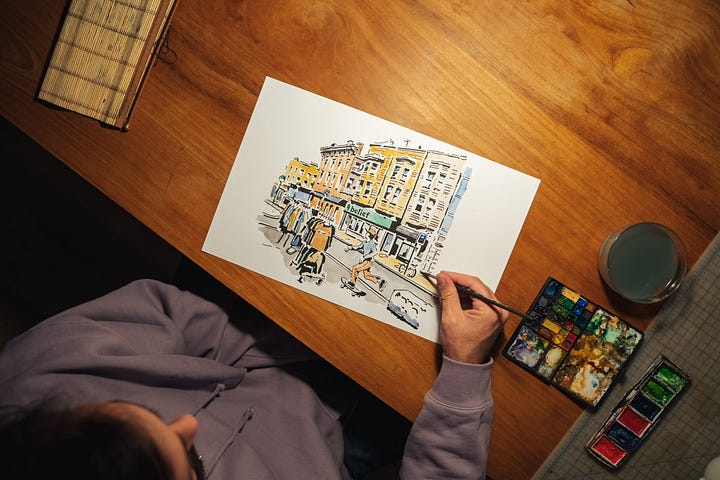
It sounds like a big part of your process is to just keep creating and see what happens.
It's like being product-oriented versus being process-oriented. The difference between those two is so important and so hard to capture. I've never had a plan for my art. I've never had an intention. I’ve never advertised. I mean, I do advertise every day by posting my work, but I’ve never deliberately gone after anything. I’ve been very fortunate that things have kind of fallen into my lap. I try them. I like them or I don't. It changes my process and changes my decision for the next time. It has just been this sort of series of incremental steps where I show up every day and do the work. I think that's what people don’t always appreciate about people with successful careers as artists. When you see somebody on Instagram or displaying art in a gallery, they probably didn’t start there. They probably did a little bit every day and took a long path to get there. It didn’t just happen overnight. They had to decide to start, and then keep showing up.
The theme of this blog is “no directions.” The idea that no one has lived the life that you were meant to live before. What’s the life that is uniquely yours starting to look like?
I think it’s this daily creative process and just having something you're excited to work on when you wake up in the morning and following that thread. Some days it's music. Some days it's art. Some days it's friends and family. It’s so important to show up every day in those different directions. Every day I’m excited to go paint in my studio, learn something new, make music with my friends, and brainstorm something to create.

